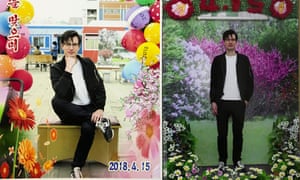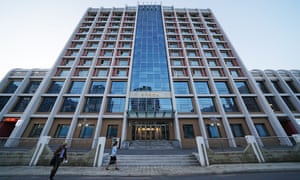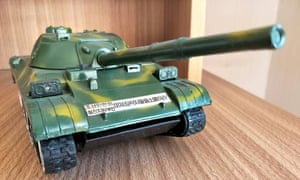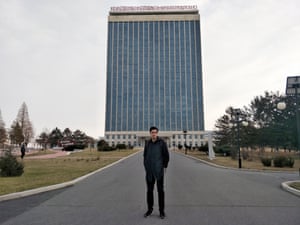'You think Trump will save you?': my nine days detained by North Korea's secret police | World news | The Guardian
'You think Trump will save you?': my nine days detained by North Korea's secret police
Alek Sigley was studying in Pyongyang when he was blindfolded and taken to an interrogation facility where his handlers demanded he confess to his ‘crimes’
Alek Sigley
Thu 2 Apr 2020 03.30 AEDTLast modified on Thu 2 Apr 2020 04.22 AEDT
Shares
25
 Alek Sigley during his studies in North Korea. Photograph: Supplied by Alek Sigley
Alek Sigley during his studies in North Korea. Photograph: Supplied by Alek Sigley“Do you know what day it is?” asked the man as we sat in the black Mercedes-Benz that had whisked me from the foreign student dormitory at Kim Il-sung university, where I had been living in the North Korean capital Pyongyang. I knew full well, but he answered his own question: “It’s the day the US imperialists invaded and started the war.”
It was Tuesday 25 June, and the start of my nine long days of interrogation at the hands of the North Korean ministry of state security – or at least that’s who I believed it was, as they never revealed who they actually were.
Blindfolds, no clocks and interrogation by ‘teacher’
That morning a gruff stranger had approached me in the internet room of the dormitory. I was in the third semester of my master’s degree in Korean literature and was finishing off my homework about a North Korean short story ahead of an afternoon class.
“You’re attending a meeting at university, come with me right now,” the man said. Something was off, he had an overbearing manner and latent aggression in his expression.

FacebookTwitterPinterest Kim Il-sung university’s foreign student dormitory, North Korea. Photograph: Alek Sigley
We sometimes had meetings on campus before, but I had an ominous feeling this one would be different.
As I followed the man and his companion out of the front door and turned the corner to the parking lot at the side, I saw the black Mercedes-Benz, which had a black plastic bag covering its licence plate.
“Fuck, you’re in deep shit now,” I thought to myself.
I was ushered into the middle back seat, the man and his colleague sitting on either side. Very quickly they were replaced, as if choreographed, by two much larger men – with the man who had asked that first question of me seated in the front passenger seat. This man, who I knew only by the appellation of “teacher” (sonsaengnim), would be my lead interrogator.
I had been quite enjoying my time at the university. The interrogation, on the other hand, was not much fun. I spent nine days in a room completely cut off from the outside world. There was no clock, and I had to sleep with the light on.
On that first day they chose to give me a warm welcome, blindfolding me in the car as they read out a long list of crimes I had supposedly committed against the North Korean state. Upon arrival at the interrogation facility, I was escorted in by two guards, who made use of the opportunity to trip me up on the stairs at the entrance. After arriving at what would be my domicile and “workplace” for the next week, a man (who thankfully made only that one brief appearance) with a crazed expression and bulging, bloodshot eyes started screaming at me at the top of his lungs.
“Do you wanna die you fucking bastard? You son of a bitch … Coming into our country and committing all these crimes. You think Trump or Pompeo will save your sorry arse? Huh?”
They asked me why I had come to their country. When I told them the truth – that I had a genuine interest in North Korean novels and wanted to do business there – I was told that it was “unnatural” that an Australian would harbour such motives, and that nobody would believe such logic. Their point was clear, we were the “enemy”.
‘Crimes’, confessions and self-criticism
Every day was spent writing forced confessions of my “crimes”, which became only more fanciful as time went on. When I objected to their allegations, they began yelling at me, reminding me that I could face execution by firing squad if I didn’t carry out my “reflection” and do it “sincerely”. The entire process was in my third foreign language, Korean.
A typical “self-criticism” session went like this:
“Alek, you do realise that this is serious business, don’t you? If you’re lucky, you’ll only get 10 years hard labour. We have a mountain of evidence on your crimes. You’d better confess if you’d like to be treated leniently.”
“I have no idea what you’re talking about. Honestly.”
“All right, let me show you an example.”
He pulls out a picture of a North Korean toy tank with an anti-American slogan inscribed on it that I had uploaded onto Instagram.

FacebookTwitterPinterest The offending Instagram post. Photograph: Alek Sigley
“You uploaded a photo of this toy tank onto the internet … That’s military espionage!”
“Is he being serious?” I thought to myself as I tried to suppress a smile.
When they finally released me, they made me read out a “letter of apology” (which they dictated to me), in which I confessed to “threatening world peace”, “infringing upon the sovereignty of the DPRK”, among other heinous acts. I was also forced to acknowledge that my human rights had been respected, an act which itself was a violation of those very rights.
They filmed this, threatening to release the footage if I ever “slandered” their country again. That, I actually wouldn’t mind, other than for the fact that in the video I look a bit nervous. I was asked to sound “mournful” but I am a horrible actor and ended up reading the letter in monotone.
A stranger in one of the world’s most xenophobic societies
I always knew that North Korea was that kind of a country, and that I was taking certain risks with what I was doing there. So in the end, I wasn’t caught by surprise when I was detained, although I was caught a little off guard.
Perhaps I found it hard to accept that this could ever happen to me, because over the years I had visited the Democratic People’s Republic of Korea, as it is formally known, I had come to associate the place with the good people I met and came to know. Reservations about North Korea’s political system aside, I had come to discover that most North Korean people were decent, honest, hard-working folk just like anywhere else.
At the university dormitory I lived alongside the specially trained and vetted local students, who were ostensibly there to teach us the Korean language and culture but in reality were spying on us. They were the only Korean students we were allowed to interact with.
North Korea is one of the world’s most xenophobic societies. I’ve never heard of a single foreigner visiting the home of a North Korean friend, even among the Chinese students. It simply has never been allowed.
But this xenophobia comes from the state, not the people.
One day, one of the Chinese students in the dormitory was playing a hip hop track on her phone. A Korean student curled her lip in disgust and said “hip hop is degenerate music”. But another one of the Korean students visited me before he was due to leave the dormitory. “You’re always listening to music Alek, can you play some of it for me?”

FacebookTwitterPinterest Alek Sigley at Kim Il-sung university in Pyongyang Photograph: Alek Sigley/Tongil Tours
---
I always used earphones not only because I didn’t want to disturb them, but also because I didn’t want to create any political trouble. But I accepted his request, and played him some tracks from the Californian virtuoso rock guitarist Buckethead, a favourite of mine.
“I can feel the han,” he said, evoking a very Korean sentiment with no English equivalent that is variously translated as resentment, grief, or sorrow. Han is often said to express the bitterness of the Korean people towards their history of suffering under Japanese colonialism. It is considered uniquely beautiful when rendered in music.
“If I practise, will I ever be able to become as good at guitar as he?”
I said yes, but in my heart I knew that while this country is kept in a state of hermetic isolation – a place where rock music and hip hop don’t officially exist – that might be unlikely.
And that’s the “lesson” I learned in all this, if there is one. The government, ruled as it is by military hardliners and a perpetually suspicious security force, may hate us for a long time to come. But, after 20 visits over a decade, I know that the people of North Korea want more openness and more engagement with the outside world.
‘Say good things about our country’
As soon as I had read out the apology and been forgiven for my “crimes”, a switch flipped inside “teacher”. We chatted about sport – he played in a soccer team – and family life – he had great expectations for his eleven-year-old son. I told him of my undying affection for my wife.
And when the investigation was officially over, he began acting like a normal human being, patting me on the back and making jokes. Call it Stockholm Syndrome, but I actually quite liked this man. The next day I was driven to the airport, accompanied by him and a few of his colleagues. This last ride was spent comparing the cost of rent in Australia and Japan, and talking about my plans for the future.
“Alek, you have a knack for writing, you should keep on doing it. Just make sure you say good things about our country in your future work and maybe we can meet again in Pyongyang one day.”
“I’ll do my best.” I said.
When the others had left the car to sort out some procedures in the airport, I sat in the carpark alone with teacher. In the next half hour, I would board a flight to Beijing and be free.
“Alek, please remember for future’s sake – we don’t hate you personally, it’s the crimes you’ve committed that we despise.”
I remained silent, but I wanted to say that right back at him.
---
* Alek Sigley is working on a book-length account of his three semesters as a foreign student at Kim Il-sung university and his nine days of North Korean secret police interrogation.
**Names and details of all North Koreans have been altered to protect their identities.
No comments:
Post a Comment